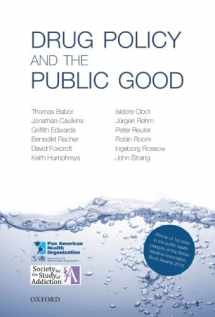
Drug Policy and the Public Good
Book details
Summary
Description
Drug use represents a significant burden to public health through disease, disability and social problems, and policy makers are becoming increasingly interested in how to develop evidence-based drug policy. It is therefore crucial to strengthen the links between addiction science and drug policy. Drug Policy and the Public Good is collaboratively written by an international group of career scientists to provide an analytical basis on which to build relevant global drug policies, and to inform policy makers who have direct responsibility for public health and social welfare.
Drug Policy and the Public Good presents, in a comprehensive, practical, and readily accessible form, the accumulated scientific knowledge on illicit drugs that has direct relevance to the development of drug policy on local, national, and international levels. The authors describe the conceptual basis for a rational drug policy and present new epidemiological data on the global dimensions of drug misuse. The core of the book is a critical review of the cumulative scientific evidence in five general areas of drug policy: primary prevention programs in schools and other settings; supply reduction approaches, including drug interdiction and legal enforcement; treatment interventions and harm reduction approaches; criminal sanctions and decriminalization; and control of the legal market through prescription drug regimes. The final chapters discuss the current state of drug policy in different parts of the in different parts of the world, and describe the need for a new approach to drug policy that is evidence-based, realistic, and co-ordinated.
The authors describe the conceptual basis for a rational drug policy and present new epidemiological data on the global dimensions of drug misuse. The core of the book is a critical review of the cumulative scientific evidence in five general areas of drug policy: primary prevention programs in schools and other settings; supply reduction approaches, including drug interdiction and legal enforcement; treatment interventions and harm reduction approaches; criminal sanctions and decriminalization; and control of the legal market through prescription drug regimes. The final chapters discuss the current state of drug policy in different parts of the world, and describe the need for a new approach to drug policy that is evidence-based, realistic, and co-ordinated.
By locating drug policy primarily within the realm of public health, this book draws attention to the growing tendency of governments, both national and local, to consider illegal psychoactive substances as a major determinant of ill health, and to organize societal responses accordingly. It will appeal to those involved in both addiction science and drug policy, as well as those in the wider fields of public health, health policy, epidemiology, primary prevention, and treatment services.
A companion volume published by Oxford University Press, Alcohol: no ordinary commodity - research and public policy, is also available.


We would LOVE it if you could help us and other readers by reviewing the book
Book review




